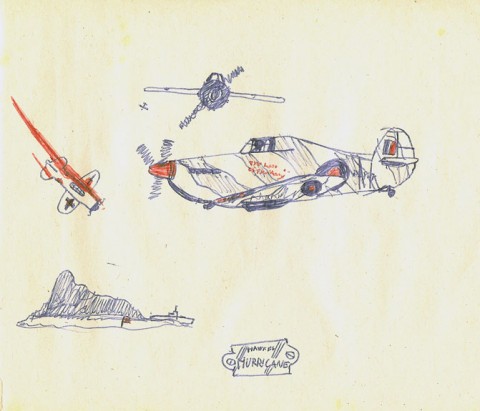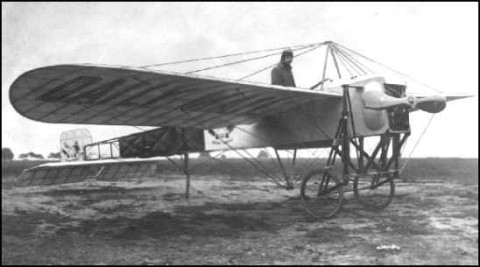The big trip to the UK looms. It’s my first and I’m greatly looking forward to it — all the more so because I have long been fascinated by the place and its history. Although I can’t say it was always my plan to do a PhD in British military aviation history, looking back, there were some clues:

Go ahead and laugh! This is a drawing I did when I was 9 or 10. It shows a Hawker Hurricane,1 specifically PZ865, “The Last of the Many”, the final production unit. I proudly showed it to our neighbour across the road, who (as I recall) had been in the air force in the war (which back then, meant the Second World War). All I can remember of his reaction was that he said the nose was too long for a Hurricane, and well, he was right :)
I used to draw a lot when I was a kid. Later on it was mostly spaceships and robots, but at this stage there were more aeroplanes than anything else. They were mostly from the Second World War and, aside from a few German adversaries in the background, they’re all British. Not Australian, and certainly not American. This was a definite bias on my part: I was also a keen (if inept) maker of model aeroplanes, and when I was given a model of perhaps the greatest fighter of the war, the North American P-51 Mustang, I did not hesitate to stick the RAF decals on it instead of the USAAF ones.
So why was I so pro-British?2 One big part of it must have been finding Paul Brickhill’s biography of Douglas Bader, Reach for the Sky (1954), on my grandfather’s bookshelf. I must have read it a dozen times or more. Of course the story of Bader’s triumph over the loss of his legs was inspiring, but the part I loved best was about the Battle of Britain itself. The gallant few against the enemy hordes. Dorniers and Hurricanes, Duxford and North Weald, Hugh Dundas and Denis Crowley-Milling. I didn’t understand it all but trying to work it out was part of the fun. And I definitely understood that the Brits were the goodies and Jerry the baddies.
So I grew up barracking for the British. This is probably a bit strange in Australia today, and perhaps requires some explanation, because Britain is nowhere near as important to us as it once was, on almost any measure you care to name. I knew they were on our side in the war, and probably had some vague idea that there was some sort of close relationship between Australia and the British going back to Captain Cook. I grew up in a smallish country town, and I suspect there was a residual affection for Britain there which disappeared much earlier in the more cosmopolitan cities. (When we moved down to Melbourne a few years later, nobody I knew cared about the war, much less 242 Squadron — which is when I turned to drawing spaceships.) But there was another, more important source of my Anglophilia: television. At this time — the early 1980s — there were many more British television shows airing in Australia that there are today, or at least it seems that way to me. British sitcoms, in particular, were common even on commercial channels, where today they are not to be found at all. (I don’t exactly miss shows of the calibre of Love Thy Neighbour, but what about something that’s actually good, like Spaced?) They only show American sitcoms now (Australian ones are almost never worth watching), which is perhaps surprising given that the Australian sense of humour supposedly has more in common with the British equivalent than the American.
There were many British shows I watched regularly at the time, but there were two I (along with all my friends) adored in particular, which were usually shown every weeknight on the ABC (the Australian equivalent of the BBC), almost continually repeated: The Goodies and Doctor Who. These were hugely effective vehicles for spreading ideas about British culture and history, usually stereotypical, distorted and out of context to be sure, but they did help me gain some sort of appreciation of this thing called “Britain”. Doctor Who is still well-known today, and deservedly winning new fans in its current incarnation, so I’ll talk more about The Goodies, which is much more obscure these days. The Goodies were three men, Tim Brooke-Taylor, Graeme Garden, and Bill Oddie, who were willing to do “anything, anytime, anywhere”, which usually ended up being some absurd job like setting up a pirate radio station and post office (in a submarine just outside the 3-mile limit, naturally), and nearly always involved oversized props at one point or another. One of the three would often end up catching megalomania, with the other two teaming up against him to cut him down to size, which is interesting when you consider that each character represented a social class (upper, middle, working) and if you take the whole thing too seriously, which you shouldn’t!
To be honest not all of it has aged that well (sitcoms often don’t) and I’m not sure if anyone would find it funny if they hadn’t grown up with it; but I still enjoy them, and if you’ve got half an hour to spare have a look at this episode, “War babies” (in three parts), which was originally broadcast in 1980 and is set during the Second World War.
There’s a lot in here, tropes and references which I absorbed impressionistically but only came to understand more fully many years later: newsreels, Neville Chamberlain,3 war fears, Lady Chatterley’s Lover, public schools, conkers, stereotypically dense German sentries, air raid sirens, gas masks, and above all, Winston Churchill: the voice, the cigars, the siren suit, the V sign, we shall fight on the beaches, never in the field of human conflict. And to cap it all off, a surreal replay of both 25 December 1914 and 30 July 1966, coming down to a penalty shootout between Churchill’s two-year-old bionic double and a German tank.
Hmmm, come to think of it, it’s probably a miracle I don’t have more misconceptions about British history than I already do …
![]() This work is licensed under a Creative Commons Attribution-NonCommercial-NoDerivatives 4.0 International License.
Permissions beyond the scope of this license may be available at http://airminded.org/copyright/.
This work is licensed under a Creative Commons Attribution-NonCommercial-NoDerivatives 4.0 International License.
Permissions beyond the scope of this license may be available at http://airminded.org/copyright/.




Brett, you can pick up with yr British popular culture by listening to Radio 4’s _I’m Sorry I Haven’t A Clue_, which usually features Garden and Brooke-Taylor, as well as the funniest man on the planet, Barry Cryer.
My impression of the ABC is that there’s quite a lot of British stuff – from Da Bill to the Katherine Tate show.
Fascintating stuff, Brett, which I’ve linked from my blog.
Not sure if you know that Bill Oddie has carved out a second career as a wildlife/bird-watching TV presenter in the ‘Great’ ‘English’ ‘eccentric’ ‘tradition’ of Magnus Pyke and David Bellamy. However, his public delving into his troubled childhood has led to some recent, bizarre televised emotional melt-downs…
Love the drawing. You’ve saved yourself a fortune in fees – when the thesis becomes a book that _has_ to be the cover!
(‘Fascintating’? Tsk. Typo – not Scottish vocabulary.)
“Go ahead and laugh! This is a drawing I did when I was 9 or 10.”
I would’ve laughed more if you’d said “and I was 28 years old. Aaaah!”. Have Stewart Lee and Richard Herring ever made it to Australia? They’re undeservedly obscure even in Britain.
Dan can probably say more about this, but I get the impression that when it comes to WWI there seems to be a lot of anti-British sentiment in Australia. Or is it just a British popular myth that Australians are critical of the British role in WWI?
Chris:
Yes, the ABC is a reliable source of British shows, but if it’s on the ABC that’s because the commercial networks don’t want it, and few people want to watch it. Unlike (as I understand it) the BBC, ABC shows get low ratings compared to the commercial stations, usually coming fourth out of the five free-to-air networks. (About the only British shows shown on the commercial stations are murder mysteries.) Regardless, the British content does help me understand things like why Adam said “Am I bovvered?” over and over during the Fear Forecast of The Runaway Bride!
Jack:
I knew about the bird-watching but not about the meltdowns! He always did seem highly-strung …
I will take your other suggestion under advisement :)
Gavin:
I haven’t heard of them, which doesn’t prove much either way.
Interesting question! I’d say yes, but it’s even more true of WWII, and in a different way. Australians do criticise the British over WWI, but it’s like an exaggerated form of the “lions led by donkeys” myth: stupid British generals sending brave diggers to die for no good purpose. It’s more tactical and operational, it seems to me … whether or not Gallipoli (which is all most people know anything about) was a good idea overall is not of interest, but that it was botched is: while the Anzacs were being slaughtered in a diversionary attack at the Nek, the bloody Poms were sipping tea on the beach at Suvla instead of advancing inland. It’s true, Peter Weir made a movie about it and all.
In WWII, it’s the opposite. Even though an entire Australian division was lost in the Malayan campaign, there doesn’t seem to be much attention paid to the possibility that the campaign could have been fought differently, and more successfully. Instead the criticism is more strategic — why was Singapore so weakly defended, but even more bitterly, why did Curtin have to force Churchill to let us have our divisions back from the Middle East, when they were needed for the defence of Australia against the Japanese? One popular book on the subject is even called The Great Betrayal (ie of Australia by Britain). Doesn’t matter that it’s basically rubbish, as one of my fellow PhD students will show in his forthcoming book …
I’d suggest two reasons for the difference. First, the incompetence of the British generals in WWI needs to be emphasised, as Gallipoli is our great national myth, it’s when we first made our mark on the international stage, showing that we weren’t just a transplanted piece of Britain. Just as adolescents pick fights with their parents. Second, the “great betrayal” in WWII was played up in order to justify the transfer of our allegiance from Britain to the United States. Like a teenager inventing an excuse to leave home … Well, those are completely IMHO, given my extensive ignorance of Australian history :)
An anecdote – a few months ago I was helping my Australian neice (13, knows a lot) with her homework, on the Middle East in 1941. I pointed out that it was a bit complicated, and illustrated this by saying “Remember who your great uncle was fighting when he got that medal.” Her reply: “The Turks, wasn’t it?” I responded that it was the French Foreign Legion, but that she wasn’t to worry overly, cos she stood in a great Australian tradition of thinking that all history is Gallipoli.
Pingback: Airminded · Companions
Pingback: The one day of the century | Airminded